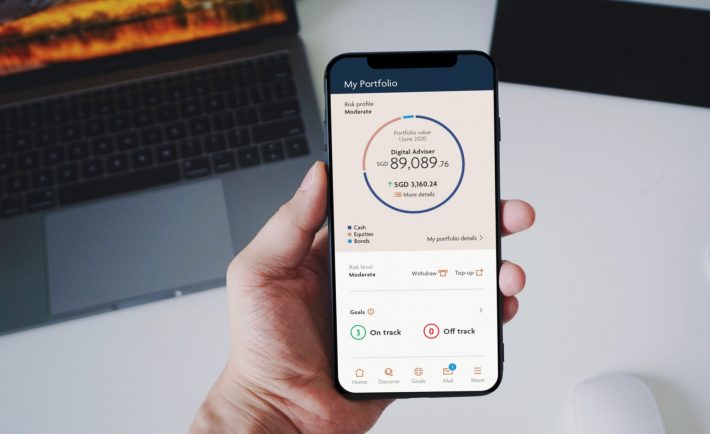Several consumer-facing Financial Technology (FinTech) companies, from digital payments to insurance and transfer payments, have arisen to support Singaporeans’ personal finances. You may have heard of robo-adviser companies such as StashAway, Syfe, and AutoWealth that help with investments.
What are robo-advisers?
To optimise investment portfolios according to the risk profile of the customer, Robo-advisers rely on algorithms. In reaction to market changes, portfolio readjustment is performed automatically.
As such, there is little need for active monitoring by the investor with all these automatic features. As seen from various posts and comment threads on local financial platforms, the low fees paid in relation to human investment advisors have further raised interest in robo-advisers.
A Statista study forecasts that assets under watch by local robo-advisers and user numbers are estimated to rise by over 50 per cent in 2021 to hit US$1.06 billion and 105,000 users accordingly.
Robo-advisers help break barriers to entry

Image Credits: Freepik
The perceived difficulty of gaining financial expertise and the scarcity of time for investment and fund management are two widely quoted reasons for not investing.
With technology assistance, robo-advisers eliminate these hurdles, making them a fantastic way to kickstart investing, particularly for beginners. This is not to mention that the procedure of signing-up is reasonably straightforward.
In 15 minutes, a profile can be registered. To propose an appropriate portfolio concerning the investor’s financial targets and risk aversion, one only needs to answer some preliminary questions.
Standard considerations include age, gender, marital status, salary, investment horizon, and priorities, such as funding for a house versus retirement planning. At the same time, risk evaluation focuses on experience with multiple financial instruments and gain and loss perception.
Once that is in place, algorithms based on current financial models will handle the portfolio. Easy peasy, isn’t it?
Advantages of using robo-advisers
The isolation of feelings from investing using robo-advisers is a gain. Investors are far less likely to respond irrationally to disruptive market developments and exit from the market out of panic, with investments using advanced automated trading.
Robo-advisers often foster healthy financial habits by encouraging clients to add to their investments on a routine basis. This induces investors to take advantage of the dollar-cost averaging (DCA), which has been proven to be a successful method for allowing the long-term accumulation of capital by novice investors.
A look at the downsides

Image Credits: fa.com.sg
No one thing in the world is perfect, and this applies to robo-advisers too. Given their emphasis on ease and effectiveness, robo-advisers cannot make investment decisions precisely personalised to each user’s financial condition.
Instead, they enable clients to pick from pre-selected portfolios from a restricted menu. They deal only with personal finance’s investment facets and miss the human touch of actual financial advisors.
Human financial planners devote much more time to identifying the needs of their customers. Thus, they can provide numerous solutions that cover various holistic financial management elements, including savings and coverage.
Is investor passivity harmful?
The low percentage of investor participation needed is one of the principal selling points of robo-advisers. But is the lack of investor involvement a cause for concern?
Investor indifference may foster a laid-back approach towards other areas of financial planning. Since computers and algorithms can assign this seemingly cumbersome task, this may lead to a refusal to gain financial expertise going forward.
Although robo-advisers cater to tech-savvy, passive, and limited-capital investors, automated investment does not appeal to active investors. This is especially so for those who want to have portfolio ownership and may be dissatisfied with having a bot controlling their assets entirely.
According to an HSBC survey done last June, only one-quarter of Singaporeans had used mobile banking to invest. This hesitation in handling digital capital shows the real lack of investment expertise or trust. It also highlights the need to empower Singaporeans with financial knowledge.
Lack of financial knowledge can be devastating

Image Credits: City Nomads
Dr Gordon Tan Kuo Siong, Faculty Early Career Award Fellow at the Singapore University of Technology and Design, shared how a lack of financial knowledge can be devastating.
Using the story of Alex Kearns, he brings out the importance of financial literacy. Last June, the news reported the death of the 20-year-old trader by suicide. After Kearns mistakenly thought he lost hundreds of thousands of dollars on Robinhood, a free-trading app, he took his own life.
For sound investment and financial planning, the acquisition of knowledge is necessary. As the term “caveat emptor” indicates, consumers’ ultimate responsibility is to perform proper research when making a transaction. Buyers should request information on the details of the items they purchase.
In short, consumers should arm themselves with the information they need on the investment products that robo-advisors suggest. As for the businesses who promote these services, it is vital to ensure adequate resources on how their products operate.
Some deets on local robo-advisers
Several local robo-advisers have also launched educational initiatives to develop more educated investors. A set of courses covering personal finance and trading on its app, as well as frequent newsletters and market insights, have been made freely available by StashAway.
Syfe posts short articles and conducts online seminars to provide the public with financial information. These programs are praiseworthy and should not be treated as unnecessary supplements.
In conclusion, if robo-advisers boost their customers’ financial literacy and consumers make an effort to consider what they are investing into, buyers will have much more interest in creating machine-enhanced financial decisions and endow their money to a robot.




